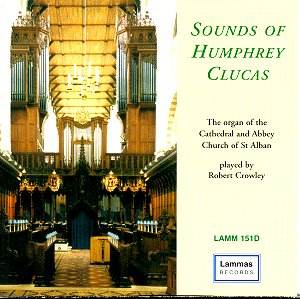Humphrey
Clucas’s lifelong connection with the Cathedral choir tradition
(he was a lay vicar of Westminster Abbey until 1999) has a lasting
impact on his career as self-taught composer. He composed a good
deal of choral music (several settings of both Evening and Morning
Canticles), some of which has been available on a United disc
released several years ago, and of organ music, most of which
he wrote in the last twenty-five years or so.
The
present release usefully presents an interesting selection of
organ works composed during the last fifteen years, since the
earliest one featured here Qui Lux Es dates from
1988 and the most recent ones (Urbs Beata,
Toccata and Three Plainsong Preludes) date
from 2000. The common denominator here is that all pieces are
based, in one way or another, on various plainsong hymns or fairly
familiar tunes. The plainsong tune Christe, qui lux es
seems to ‘obsess’ the composer quite consistently, for several
pieces here are based on it, not least the concluding item Qui
Lux Es, but also in the Prelude of the Suite
of 1993 as well as in the final section of the choral work Lux
Hominum.
Clucas
displays a great deal of imagination and invention in his handling
of the plainsong tunes. From this point of view, Urbs Beata,
based on Blessed city, heavenly Salem is particularly inventive
and resourceful. The contrasted variations include, among other,
a fleeting Scherzo of great verve. The five-movement Suite
of 1993 again makes extensive use of several well-known tunes:
variations on Christe, qui lux es, an impromptu on Tonus
peregrinus, a Nocturne on Rorate coeli in which the
hymn is eventually transformed into a "slightly spectral
waltz", a Scherzo on Dies irae and the final set of
variations on Veni Creator Spiritus.
In
spite of its title, the Sinfonietta of 1994 also
uses several tunes, though not necessarily plainsong hymns. Indeed
the Prelude has Tantum ergo as its second subject whereas
the Chorale is based on the German hymn-tune Soll’s sein.
More surprisingly, though, the concluding Toccata is based on
the Welsh folk-song Suo-Gân, generally considered
as a lullaby.
Robert
Crowley has already recorded the Passacaglia of
1988 (Lammas LAMM 103 D, to be reviewed shortly). The Coventry
Carol is used here as the second theme. At the climax of the
work, the carol’s theme becomes a sort of cantus firmus,
to grand effect indeed. The Passacaglia is one of
the finest and most impressive pieces here.
The
remaining items (Toccata, Credo, Adoro
Te and the Three Plainsong Preludes) are
all shorter, but none the less quite attractive in their own right.
Definitely, the sort of stuff that deserves to be popular among
organists. I particularly enjoyed the preludes.
Clucas’s
organ music is superbly crafted and very attractive, though it
may not be that easy to bring off satisfactorily. Needless to
say that Robert Crowley’s impeccable readings are a joy to listen
to. Magnificent recording throughout. A most welcome and rewarding
release on all counts.
Hubert
Culot
